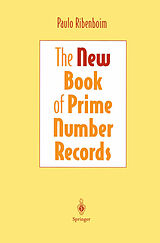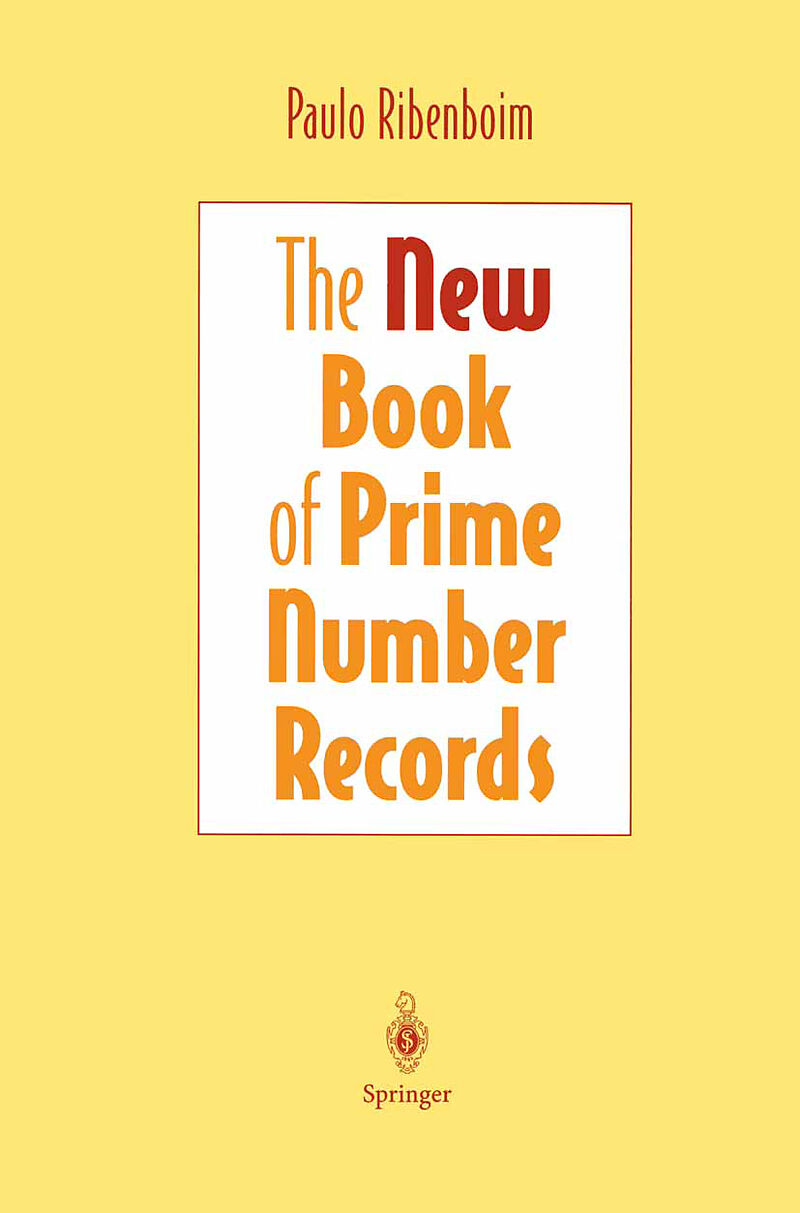The New Book of Prime Number Records
Einband:
Fester Einband
EAN:
9780387944579
Untertitel:
Englisch
Autor:
Paulo Ribenboim
Herausgeber:
Springer New York
Auflage:
3rd ed. 1996
Anzahl Seiten:
572
Erscheinungsdatum:
02.02.1996
ISBN:
3540970428
This text originated as a lecture delivered November 20, 1984, at Queen's University, in the undergraduate colloquium senes. In another colloquium lecture, my colleague Morris Orzech, who had consulted the latest edition of the Guinness Book of Records, reminded me very gently that the most "innumerate" people of the world are of a certain trible in Mato Grosso, Brazil. They do not even have a word to express the number "two" or the concept of plurality. "Yes, Morris, I'm from Brazil, but my book will contain numbers different from ·one.''' He added that the most boring 800-page book is by two Japanese mathematicians (whom I'll not name) and consists of about 16 million decimal digits of the number Te. "I assure you, Morris, that in spite of the beauty of the appar ent randomness of the decimal digits of Te, I'll be sure that my text will include also some words." And then I proceeded putting together the magic combina tion of words and numbers, which became The Book of Prime Number Records. If you have seen it, only extreme curiosity could impel you to have this one in your hands. The New Book of Prime Number Records differs little from its predecessor in the general planning. But it contains new sections and updated records.
Autorentext
Paulo Ribenboim ist emeritierter Professor der kanadischen Queen's University, Fellow der Royal Society of Canada und Träger des George Pólya-Preises der Mathematical Association of America. Er ist Autor von 13 Büchern und über 150 Forschungsartikeln.
Klappentext
The Guinness Book made records immensely popular. This book is devoted, at first glance, to present records concerning prime numbers. But it is much more. It explores the interface between computations and the theory of prime numbers. The book contains an up-to-date historical presentation of the main problems about prime numbers, as well as many fascinating topics, including primality testing. It is written in a language without secrets, and thoroughly accessible to everyone. The new edition has been significantly improved due to a smoother presentation, many new topics and updated records.
Zusammenfassung
"Yes, Morris, I'm from Brazil, but my book will contain numbers different from *one.''' He added that the most boring 800-page book is by two Japanese mathematicians (whom I'll not name) and consists of about 16 million decimal digits of the number Te.
Inhalt
1 How Many Prime Numbers Are There?.- I. Euclid's Proof.- II. Goldbach Did It Too!.- III. Euler's Proof.- IV. Thue's Proof.- V. Three Forgotten Proofs.- VI. Washington's Proof.- VII. Fürstenberg's Proof.- VIII. Euclidean Sequences.- IX. Generation of Infinite Sequences of Pairwise Relatively Prime Integers.- 2 How to Recognize Whether a Natural Number Is a Prime.- I. The Sieve of Eratosthenes.- II. Some Fundamental Theorems on Congruences.- III. Classical Primality Tests Based on Congruences.- IV. Lucas Sequences.- V. Primality Tests Based on Lucas Sequences.- VI. Fermat Numbers.- VII. Mersenne Numbers.- VIII. Pseudoprimes.- IX. Carmichael Numbers.- X. Lucas Pseudoprimes.- XL Primality Testing and Large Primes.- XII. Factorization and Public Key Cryptography.- 3 Are There Functions Defining Prime Numbers?.- I. Functions Satisfying Condition (a).- II. Functions Satisfying Condition (b).- III. Functions Satisfying Condition (c).- IV. Prime-Producing Polynomials.- 4 How Are the Prime Numbers Distributed?.- I. The Growth of ?(x).- II. The n th Prime and Gaps.- Interlude.- III. Twin Primes.- Addendum on k-Tuples of Primes.- IV. Primes in Arithmetic Progression.- V. Primes in Special Sequences.- VI. Goldbach's Famous Conjecture.- VII. The Waring-Goldbach Problem.- VIII. The Distribution of Pseudoprimes, Carmichael Numbers, and Values of Euler's Function.- 5 Which Special Kinds of Primes Have Been Considered?.- I. Regular Primes.- II. Sophie Germain Primes.- III. Wieferich Primes.- IV. Wilson Primes.- V. Repunits and Similar Numbers.- VI. Primes with Given Initial and Final Digits.- VII. Numbers k×2n±1.- VIII. Primes and Second-Order Linear Recurrence Sequences.- IX. The NSW Primes.- 6 Heuristic and Probabilistic Results about Prime Numbers.- I. Prime Valuesof Linear Polynomials.- II. Prime Values of Polynomials of Arbitrary Degree.- III. Polynomials with Many Successive Composite Values.- IV. Partitio Numerorum.- V. Some Probabilistic Estimates.- Conclusion.- The Pages That Couldn't Wait.- Primes up to 10,000.- Index of Tables.- Index of Names.

Leider konnten wir für diesen Artikel keine Preise ermitteln ...
billigbuch.ch sucht jetzt für Sie die besten Angebote ...
Die aktuellen Verkaufspreise von 6 Onlineshops werden in Realtime abgefragt.
Sie können das gewünschte Produkt anschliessend direkt beim Anbieter Ihrer Wahl bestellen.
Loading...
Die aktuellen Verkaufspreise von 6 Onlineshops werden in Realtime abgefragt.
Sie können das gewünschte Produkt anschliessend direkt beim Anbieter Ihrer Wahl bestellen.
| # | Onlineshop | Preis CHF | Versand CHF | Total CHF | ||
|---|---|---|---|---|---|---|
| 1 | Seller | 0.00 | 0.00 | 0.00 |
